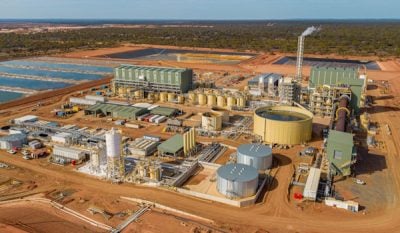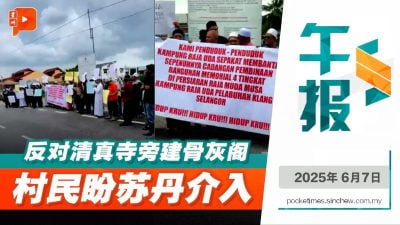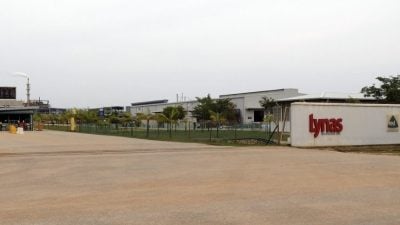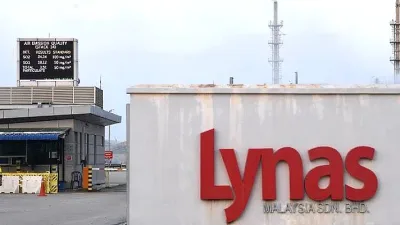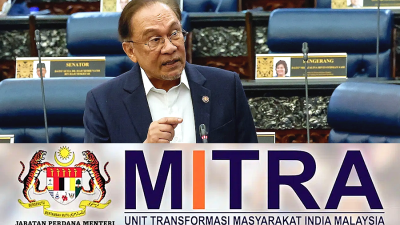Operators of polluting industries are spreading their tentacles to developing countries avid to pursue their industrialization goals, in a way such catastrophic “social costs” are being transferred across international borders.
Minister of Science, Technology and Innovation Chang Lih Kang said on Wednesday that the government had approved Lynas’ application to renew its operating license.
However, the unity government will not allow Lynas to continue producing radioactive waste, and has rejected Lynas’ application to lift the bans on cracking and leaching (C&L) activities, the generation of water leach purification (WLP) residues and the importation of lanthanide concentrates from Australia.
In short, the government has banned Lynas from resuming any industrial process that will produce radioactive waste.
Lynas must also make sure its permanent disposal facility stores only radioactive waste generated before this July.
The Najib administration approved the application by Australia’s Lynas to set up a rare earth factory in Kuantan, Pahang, and the first batch of raw materials arrived here from Australia in November 2012.
From that moment on, political parties on both sides of the divide, NGOs and local residents have been fighting with the government against the rare earth factory for the following decade.
Tun Mahathir once vowed to kick Lynas out of Malaysia, but when he became PM for a second time, he approved the continued operation of Lynas against the will of majority of Malaysians.
The erstwhile anti-Lynas warrior, DAP’s Wong Tack was forced to take all the blame. He said after he was defeated in the 15th general election that he was forced to take the wrath of the people just because PH failed to fulfill its election pledge after taking over the government in 2018.
The processed rare earth elements boast a very wide range of applications making 21st century modern technologies possible, from day-to-day applications to highly specific industries such as aeronautics components, electronics, nuclear and superconductor industries.
No doubt, these rare earth elements will not pose any hazard to mankind if they are allowed to lie quietly under the ground. But the thing is, the ten or so elements associated with rare earth such as uranium, thorium (with half-lives of 4.4 billion years and 13 billion years respectively) and other highly radioactive elements will release the radioactive radiation during processing, severely contaminating our water sources, soil and surrounding environment, posing serious threat to the health of humans and animals.
China is the world’s largest rare earth exporter, and the city of Ordos in Inner Mongolia is known as the world’s rare earth capital. However, residents living in the vicinity have the highest incidence of cancers in the whole of China.
In Ganzhou, Jiangxi province, some 50,000 people living in one of the counties were affected by rare earth mining, and the cost of restoring the area’s original form will cost at least RM24 billion. Even then there is no guarantee the place will still be livable after the rehabilitation.

If the rare earth industry is perfectly safe from mining, processing to waste disposal (storage), why then didn’t Lynas choose to process the rare earth at its Mount Weld mine instead of shipping the raw materials across the seas to Malaysia for processing?
The only explanation is that the procedures will cause irreversible environmental degradation!
While the Aussies are making the money from rare earth, we Malaysians are made to bear the social cost of environmental pollution. Is this fair?
According to Australia’s “experts,” the rare earth from Mount Weld is extremely low in radioactivity and consequently the areas surrounding Mount Weld are unusually pollution-free, making rare earth mining a very attractive investment there.
Well, if these “experts” are right, why should they take the trouble of sending it over here?
It is inexcusable for the past federal administration to surrender the pristine sky and sea of this beloved country of ours to the highly contaminating industry, a major “human disaster” which is squarely unforgivable!
How many job opportunities have been created by this Australian investment? How much government tax revenue has been generated? Not a lot, for sure.
Approving Lynas is akin to betrayal of the nation. It is now time to put everything to a complete halt.
In his epic poem Aeneid, Roman poet Virgil talked of the ten-year war between the Greeks and the Trojans. In the end, the Greeks built a great wooden horse with soldiers hidden inside, which the Trojans wheeled unknowingly into the city.
Isn’t the Lynas plant the 21st century version of the Trojan Horse?
Malaysia is not a very wealthy country. We do need foreign investments. But, we are not that impoverished either, that we have to receive with open arms any form of investment, even the malicious ones!
Lynas says they have been “operating safely” in this country for over ten years, but what we would like to point out here is that the harms of radioactivity will typically not show up within a short time.
Today, we have all the right to know who approved the Lynas plant ten years back. Was there something concealed from the rest of the country? We will need to pursue accountability in order to completely fend off the “invasion” of such harmful investments.
Highly developed Western countries, and even China today, are very prudent in admitting potentially polluting industries because they do not want companies to create public health menace in their continuous pursuit of profitability.
As a consequence, the operators of these polluting industries have spread their tentacles to developing countries avid to pursue their industrialization goals, in a way such catastrophic “social costs” are being transferred across international borders.
On December 3, 1984, an epic disaster broke out in India, in which highly toxic gas methyl isocyanate was leaked out from US-based Union Carbide’s pesticide plant in Bhopal, causing the death of 25,000 people, with another 200,000 suffering permanent disabling injuries.
Such a tragic aftermath could also happen in Malaysia, if we knowingly allow highly polluting industries to operate here.
ADVERTISEMENT
ADVERTISEMENT






